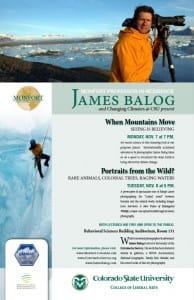 By the spring of 2007, SueEllen Campbell and John Calderazzo (ASLE members, writers, English Department colleagues, spouses) had become truly alarmed about climate change. Determined to find something they might do that felt more immediate and practical than writing, they collected ideas from colleagues around campus, noodled around at their kitchen table, and, in very short order, with nobody’s permission and almost no money (though support of all kinds appeared right away), started the education and outreach initiative they called Changing Climates @ Colorado State.
By the spring of 2007, SueEllen Campbell and John Calderazzo (ASLE members, writers, English Department colleagues, spouses) had become truly alarmed about climate change. Determined to find something they might do that felt more immediate and practical than writing, they collected ideas from colleagues around campus, noodled around at their kitchen table, and, in very short order, with nobody’s permission and almost no money (though support of all kinds appeared right away), started the education and outreach initiative they called Changing Climates @ Colorado State.
With the motto Climate Change Is Everybody’s Business—and the framing metaphor of Hokusai’s series of woodblock images of Mt. Fuji—they work to make available high-quality, up-to-date, multidisciplinary information about climate change, always in a form accessible to (and mainly intended for) educated, curious, adult non-specialists.
They began by organizing free talks on campus and nearby: some 120 talks by almost as many speakers, drawn from 27 academic departments, all eight colleges, and various other campus, community, regional, and national entities. With extensive advertising they garnered a total audience headcount of some 6,000. They offer communication training and coaching to scientists who want to better communicate with the public (in time chunks from 20 minutes to a week), focusing on such basics as clarity, liveliness, and story-telling. And they have developed an extensive multidisciplinary website, 100 Views of Climate Change that features “college-level content and primer-level clarity.” The site’s 21 pages offer over 450 annotated entries with links to videos, books, articles, other key websites, and some handouts, on topics that include climate science, ecology, economics, policy, ethics, emotions, misinformation, climate/human history, communication, and much more.
Although Campbell and Calderazzo say they could not have done this work without the training and experience of their earlier careers as teachers, researchers, and writers, this work has taken them far from their roots and beyond their familiar territories. They are supported by an NSF climate-modeling grant, most of the conferences they now attend are scientific, and they work more with colleagues from other departments than with their own. Their initiative has also sparked campus collaborations and conversations, posed new and rewarding personal and professional challenges, and allowed them to join a much larger community of concerned people.
